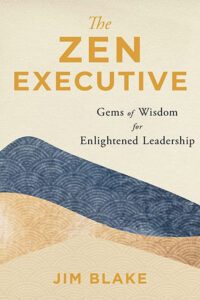The Zen Executive With Jim Blake
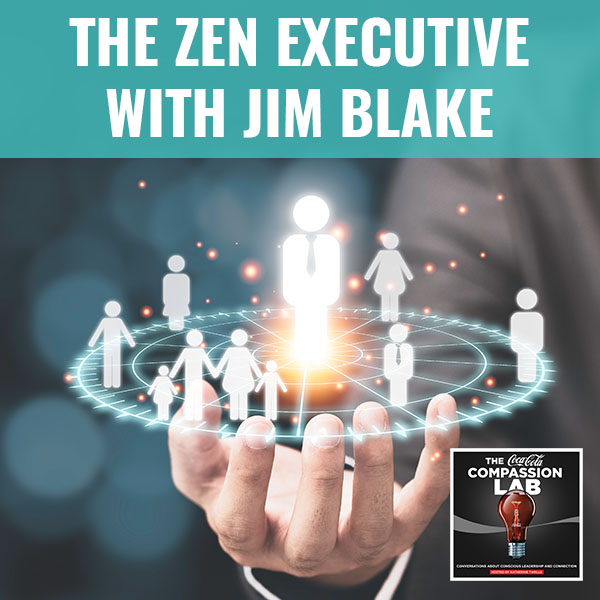
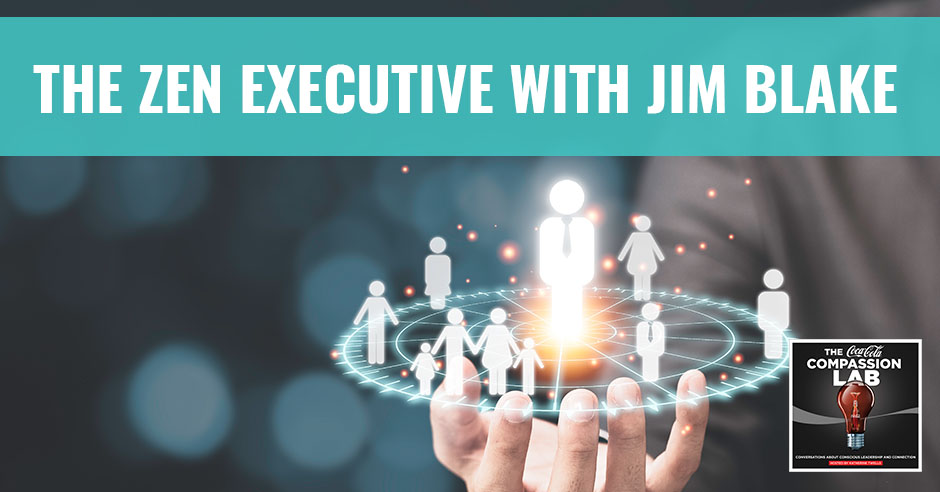
To be a Zen Executive is to lead by example because you influence your people’s lives. What you do at work affects their self-care after work. That is why you need to work on both yourself and others. Here to combine spirituality with business, join Katherine Twells as she talks to Jim Blake about his new book, The Zen Executive. Jim is the CEO of Unity World Headquarters, a spiritual nonprofit founded in 1889. He helps people of all faiths and cultures apply positive spiritual principles in their daily lives. Find out how Jim teaches his beliefs in the corporate world. Learn more about intuition and why self-care is important. Discover your why so you can have a great vision and mission as a company. And find out what emerges from all the chaos happening in the world today. Become a Zen Executive today!
—
Listen to the podcast here
The Zen Executive With Jim Blake
Gems Of Wisdom For Enlightened Leadership
I am talking to someone who lives the principles of compassion and connection every single day. A CEO of Unity World Headquarters, Jim Blake understands the intersection between leading a prosperous business and modeling conscious leadership. Jim served as Chief Information Officer and Vice President of Operations at Unity before leaving to expand his perspective, knowledge, and experience by leading the customer operations for a global energy management firm.
Ultimately, Jim found his way back to Unity, a CEO in 2016, to lead them into a brand-new future. He has more than twenty years of executive leadership experience with some of the fastest-growing and most innovative companies in North America. His new book, The Zen Executive was recently released in May of 2022.
You’re going to hear in our conversation how Jim uses the practices he’s cultivated over years of experience to ensure that he’s creating an expansive culture that allows people to bring their very best selves into the shared endeavor. He’s a very wise leader with so much to share in regards to ensuring that our work lives are driven by passion and purpose. Please enjoy the conversation with the remarkable Jim Blake.
—
Jim, I am incredibly grateful that you’re taking the time to have this conversation. Thank you so much.
It is my honor and privilege to be with you. Thank you.
We have got a lot of good stuff to get into. I want to get started with the beginning and where it all started for you. The readers know a little bit about you from a biography standpoint, from your experience, but there is so much more to us than that. It’s our story, how we were shaped, and how we get to where we are. Would you share with our readers a little bit about your origin story?
I grew up pretty lower middle class. I was the first person in my family to go to college. I got an athletic scholarship by playing football. There is where I began to uncover some things about myself. When I was a kid, my family wasn’t very religious at all but my mother religiously put me on the Sunday School bus to a Baptist Church down the road. That was my first exposure to any religion at all. It was never reinforced. It was something that she did with me until my early teens.
When I got to college, I took a World Religions course. Growing up here in the Midwest and not having a lot of exposure to these other teachings began to open my mind. I don’t know why, but I felt connected to the beauty in all of the different traditions as well as the universal truths. That put me on my seeker’s path, which would appear to be in direct contradiction with my major, Computer Science. I was a bit of an odd mix, to begin with, but it all started there.

Zen Executive: Meditation creates some space between yourself and your chattering mind. And in that space, ideas, clarity, and guidance begin to emerge.
I graduated with a Computer Science degree, began my work, and immediately went down the path of materialism and chasing big homes and cars. I thought, “For sure, this is the path to happiness.” Wealth became my primary focus. I pushed myself to reach certain financial annual salary objectives by the age of 30 and so forth. I did all that. I discovered I don’t feel any different. It didn’t bring me the sense of fulfillment and happiness that I was searching for. The secret in me reawakened. I began to study a lot more in terms of general spirituality. I learned a lot about energy work and Eastern philosophies. I began to practice yoga.
Again, it was an odd mix because I was working in very large corporate firms. I started at about a $12-billion bank here in the Midwest. I started at a corporate partnership law firm with about 80 attorneys. Here I was, this seeker and exploring all these other sides of the brain experiences and knowledge while co-existing in the corporate world. It began to open me up in terms of how the two might merge, who I wanted to be in the world, and how I was different from what I was experiencing. That’s generally how it all started.
New Thought
It was so interesting when we first met. We talked a little bit about the separation of church and state. There’s the business, and then there’s this mystical side of our beings. We were chatting about the incredible visionary founders of Unity. We’re going to talk about Unity and a little bit more about the place that you lead. There’s so much unlock in our personal power and potential. It’s just people no matter what domain we’re in, whether you’re in Information Technology, a plumber, a janitor, a corporate executive, or in a monastery somewhere.
We’re still developing our whole person and that chase towards achievement and money. It is natural to the culture we live in. Certainly, in the US, the culture is about he who dies with the most toys or the biggest prize wins. We then all learn there’s way more than that. Isn’t it interesting how we divide as if somehow these places can’t co-exist? We’re going to talk in this conversation about how they do and need to co-exist.
The founders here and the whole group of people that were a part of that New Thought Movement were way ahead of their time in thinking. I’ll give you a little nutshell of what that means. New Thought, in general, is a family of traditions. That includes Unity. It includes what used to be Religious Science, which is now Centers for Spiritual Living, and something called Divine Science. All of these traditions have churches and centers all across the country where they’re teaching these things.
Reverend Michael Beckwith has been on the Oprah show and released a lot of books. He’s the Founder of Agape International. He is under the New Thought umbrella and these are teachings that came from the East. In fact, the founders here called this Unity because they felt they had identified some of the best teachings in all of the traditions and combined them into the philosophy that we teach here at Unity. It’s primarily related to the interaction between our thoughts, our beliefs, our emotions, and our consciousness and the effects that these have on our life experiences. How do these impact our day-to-day life experiences?
All of these traditions call themselves non-denominational. Many of them were couched in Christianity because it was the dominant faith system here in the US in the late 1800s. To quote the founders of Unity, they would tell you that these principles they teach will help a Buddhist be a better Buddhist or a Catholic be a better Catholic. We see some of that in the demographics of the magazines and things that we publish.
That’s a little bit about the New Thought philosophy and a little bit about community. How does that tie to what you mentioned? How can these two intersect? Your experience of life is all of it. It’s your work. It’s your personal life. It’s your vacation. How do those teachings around mind and emotions affect your experience of life? How can you apply those across the whole self? You alluded to that earlier. You are spot-on in that regard.
In the corporate world, you have to couch your teachings and beliefs in secular terms without anyone knowing. Share on XIt’s so fascinating because language is an interesting thing. You can go to different doctrines. They might be having the same teaching, but it’s told in a different language. I love the idea of the Unity umbrella that says, “There are these universal truths that we can learn from, a roadmap to how I live a higher conscious and empowered way of life.”
The Zen Executive
In doing this, you’re getting the blocks out of the way that people might get stuck on language over a certain doctrine and looking at, “This is how we live more powerfully.” These same principles are taught in very secular places, whether it’s personal development seminars or things like that. You can find them all through the culture. You’ve written this incredible book. It’s a beautiful book, The Zen Executive.
You’ve taken the journey that you’ve been on, not just at Unity but also going to work in other domains. We’re going to talk about that. You’ve talked about how these principles come into the business arena and empower the engine of growth and profitability. It’s not wrong to grow, make money, and do all that, but they co-exist beautifully together. Can you talk a little bit about what it was to bring that book together, take all those learnings, and put them into one place?
I stumbled into this by accident. I ended up working here at Unity from 2006 to 2011, where I was on the executive team. It’s a highly complex business. It’s a publishing arm. It’s a retreat center. They published books. There’s a large prayer ministry that maybe we can talk about later, but the complexity of it makes it run a business. At the same time, we’re deeply rooted in the spiritual teachings that have been espoused around here for 100 some odd years.
During my time here, our CEO said, “If we wanted to enroll in the Master’s program and get a Master’s of Divinity and study World Religions and those things, we could as long as we could maintain our workload.” A couple of us had done that. I was feeling comfortable and grounded. I felt I had a good spot. Someone recommended me for a job at a global leading energy company. I had left here, gone there, and threw my hat in the ring. Unbeknownst to me, they called. I hadn’t interviewed in a couple of years. I thought, “I should probably do that. All the business books say you should interview every so often to keep your skills up.”
I went and it was an intriguing offer and position. The more I explored it, the more I was open to it. I had this real tension inside of me because I felt comfortable where I was. I felt I was on the right path, and then there was this other opportunity. At that time, I was deep into my meditation practice and trying to develop my own intuition. I took it into meditation, and the answer came out clearly. For me, it’s a feeling, but the words were, “Leave the nest.” I didn’t believe it. I took it into meditation ten more times.
I honored it then I ended up in the corporate world. I’ve been in this other place where I could combine the ideas around meditation, affirmations, positive thinking, what that means, and how to control your thoughts and emotions. I am dropped dead center into the utility industry, which is largely men, hierarchical, and not known for its compassionate leadership and so forth.
I struggled with, “How am I going to do this?” It began to unfold exactly the way you alluded to earlier naturally. I was able to do all of these things but couch them in secular terms, in corporate PowerPoint decks, and get the same energy going in the same belief system without anyone knowing where these ideas came from.
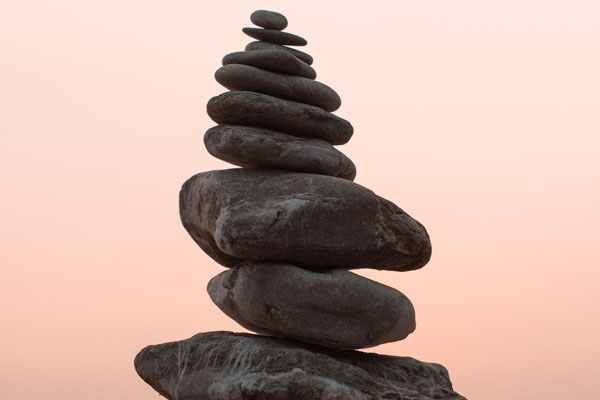
Zen Executive: If you’re not taking care of your body, you’re only 40% of your capacity to actually be in the world and make decisions. So take better care of yourself. Put yourself in the best position.
You were spiritually hijacking them without knowing.
It wasn’t intentional. I had spent enough time at Unity that it was ingrained in my leadership style. I didn’t know how to do it in any other way other than changing the language to something universal that everyone could grasp and knowing that I wouldn’t offend somebody if they were involved in a different tradition.
I love that you did that because it’s one thing. People would be reading saying, “It’s Unity. Your whole business is around spirituality. You can lead this way.” What’s wonderful about this story is you took it into a completely different domain. I go back to the language. We get stuck there, but it’s about ways of being and living that produce the right action and result.
It’s cause and effect. We complicate it sometimes. When you dig underneath, it’s like, “When we do these types of things, it leads somewhere good.” Here’s a question for you. I’m curious about this. Einstein said, “Man has been given two gifts, one of rationality and one of intuition, and they are meant to serve each other.”\
Intuition & Meditation
In our culture, we worship rationality, knowledge, and concrete things. It’s easy and safer. When you get into the intuitive side, it can get a little bit softer and harder to understand. You utilize your intuition to make this decision. There have been very big business decisions that have been made on gut feel, not on the numbers of the logic but, “I have a feeling.” It’s underdeveloped. Can you talk a little bit about the power of utilizing intuition along with rationality?
I’m not sure of the reason why it’s so underutilized. I was in this category. I didn’t know I had intuition. I thought this was a gift that was reserved for psychics, mediums, and those that had been touched in a special way. I began my simple practice of meditation, which is not four hours a day or anything like that. It’s 15 minutes a day just becoming still. I began to create some space between myself and this chattering mind that was always going on and on.
In that space, ideas began to emerge. Guidance began to emerge. Clarity began to emerge. A-ha moments that we have once in a while began to happen on a regular basis. I began to dig into this and talk to some of my associates and they’re like, “It’s your intuition. Everybody has it.” I didn’t know everybody had it. The thing for me is, “How do I develop this and connect to it?” I want to tell everyone reading that you have the gift of intuition. It may be different for you than it is for me.
My guidance comes to me in a feeling. For some people, it comes in images. Other people hear clearly a voice in a sentence that’s telling them what they need to do. There is internal wisdom that exists in all of us. If we become still, we can access it. It has changed the course of my career and my life. Don’t get me wrong. I’m an IT guy by trade. Facts and data are my foundation. I’m always looking at the facts and the data, but I am heavily reliant on intuition as well. It is something that we can all develop and use to help us make big decisions or determine what the next steps might be.
You absolutely have the gift of intuition. There is internal wisdom that exists in everyone. Share on XI invite you all to find something. If it’s not meditation, for some people, it’s a nature walk. For other people, it’s doing art. For some, it’s outdoors in general. Whatever it is, that gives you a place where you can still your mind. You’ll find that you create some space. Creative thinking, inspiration, and things that you didn’t expect will begin to infiltrate your consciousness. You’ll have the opportunity to act on them. You won’t regret it.
You said a lot of things, but this idea of getting still is something so important. We are living in an age of so much distraction. Technology is amazing. We’re using it. It’s wonderful, but We don’t even have to stand in a line at the grocery store without saying, “I’m bored for a minute. Let me pull up my iPhone and check social media.” With that level of distraction and busyness, a lot of people have a lot on their plates. They’re very overworked and juggling a lot. What’s missing is that space. To quote Viktor Frankl, “It’s that space right between stimulus and response. That is where so much happens.”
Think about the times when something has triggered you. You were stressed out. You were tired and you reacted. There’s so much regret and sometimes so much damage that’s done. We’re human. We’re not going to be perfect. This is not about being perfect. These practices like meditation do bring that stillness into the moments, not just the 15 minutes that you’re doing it, but all day long. It used to be when you would say meditation, and people are like, “Are you one of those hippy people?” Now it’s become so much more mainstream, which is amazing to see that people do start to understand that it’s a powerful tool.
The real magic around any of this and the point of becoming still is understanding that we are not our minds. Michael Singer calls it the noisy roommate, that chattering voice I talked about. For the longest time, I thought I was the only person who had it but everyone has it. It’s often critical of us. The space gives you the ability to begin to understand you are not that. You can stop that. You are the observer that sits behind that. As the observer, you can change what is happening.
If you’re a person who continually thinks negatively or thinks, “I’m unlucky in life,” that thought and continued belief that you carry with you impact your whole experience of life. You leave no opportunity for something that could be lucky or good fortune to come in because you’re saddled with this belief that you’re unlucky. You’ve drawn a conclusion. You go around gathering evidence saying, “See how unlucky I am.” There have been twenty opportunities before you where you could have made a different choice if you had believed in the idea that you might be lucky or have good fortune.
It’s important to understand how the mind can create this lens through which we live and limited ceilings for all of us. The idea that we are not our minds and that we can use tools like affirmations to change the thinking patterns and stop a spiral around fear or negativity to lift us up out of it is important. The power behind becoming still is to create that separation and then begin to understand how you can pivot it to create what you want and want to experience in life.
A mind is an amazing tool but a poor master. We need to master our minds and the belief system is true. There is so much information coming at us at any given moment. We have to filter that out. We can’t take it all in. We tend to naturally filter and find whatever we expect. We expect to see things that are wrong or negative or people that disrespect. We can find it. We’re good at gathering evidence to that. That starting point is a powerful place to start. I agree. I try to anticipate what people who are reading might say. This comes up a lot in the conversations.
Having Time For Self-Care
This show is called the Compassion Lab because we are experimenting with how to be stronger, better, and more conscious through compassion for ourselves through others. A big part of that is self-care and being able to fill your own tank so that you can give to the world. You have a lot about the power of self-care in the book. People say, “I don’t have time. I’m too busy. I’m a parent. Maybe I’m a single parent. I have this going on.” What would you say to the people that say that?

Zen Executive: Understand that there are times you’re not going to do this exactly the way you want, and that’s okay. If you feel like sleeping in today, take a nap. That’s your own intuition talking to you.
It’s not to be snarky about it, but my first question would be, “How’s that working for you?” For a lot of us, that doesn’t work when we’re not making time for it, and we’re still struggling. That awareness is the first step. I’ll break it down into the logic behind it all. The whole first section of the book is based on self-care. Let’s say that I sleep four hours a night because I’m working all the time. I don’t drink enough water or eat the right foods, and I’m not getting any sleep.
If I took any one of those individual things and told you the ramifications of them in terms of what they do to your brain power, your ability to process and make decisions, how they make you feel, and what it does to your emotions, this isn’t me. This is all science. Those are basic elemental things that we do to take care of our physical body. When you’re not doing those things, you’re maybe 40% of your capacity and your ability to be in the world and make decisions.
I’m hoping that people will begin to connect that if I take better care of myself, I put myself in the best position. You touched on one of the very things. I’m tired, I’m hungry, and I don’t have the right food I need in terms of my brain’s chemical balance and all the nourishment that I need for those systems. I’m reacting if something’s come up that I have to react to versus if I’m well-rested. I’m taking care of myself. I’m getting some occasional exercise. I have endorphins. I’ve taken some time to be still. I’m very centered and physically. I am much more capable and able to handle what shows up in front of me.
I’m not going to go straight to reaction and have regrets later because I’m not sleepy or cranky and all of those things. I’m centered. I don’t hope that makes sense. The whole idea is that you can’t pour from an empty cup in service, but you also can’t function that well in general. My argument is always, “You can’t afford not to make time.” If you want to change how you’re showing up and how you are in the world, you have to put yourself first.
Professional athletes train for their job. They have chefs, doctors, and all of that stuff that help them prepare themselves physically for peak performance. We can’t all afford those things and I’m not saying we should all do that, but I am saying use that philosophy. How do I put myself in a position to be at peak performance as a mom, a professional, a coach, and whatever it is? Trust me. When you do these things, you’ll see a significant difference in your own capacity to think, make decisions, be productive, and how you be in the world because you’re well-rested and you’ve done a good job of self-care. Does that make sense?
Yes. You’ve lived this, Jim. I read part of the book when you were completely out of alignment. You’re traveling all the time. You’re not eating well. This isn’t a theory you are talking about. You have lived both sides of peak performance and non-peak performance.
I have. People would be surprised at how much it impacts your state of being. When you’re traveling and working all the time, you come home, and your spouse, partner, or family wants to connect, and you’re tired and cranky, it doesn’t go well. Those relationships suffer badly. Eventually, if you go see a doctor for your annual checkup, that will also be suffering. You can’t help it. When you start to spiral down and aren’t taking care of yourself, you’re not going to respond to the world in a way that is supportive of those you work with, your family, and your friends.
There was a time when I was in a bad place and my relationship suffered badly. My role as a father suffered. Some of those realizations put me on a path to, “I got to make some changes here. I’ve got to figure out how to make it all work. How can I do what I need to do for work but at the same time create some balance so that I can be a better father, a better partner, and a better person in the world?”
Understand that you are not your mind. You are the observer that sits behind that. Share on XIt’s unfortunate but true that sometimes we have to make mistakes to get the learnings. We could talk about this, and I guarantee you, there are people reading, going, “I know that,” but they’re not necessarily taking those actions. Sometimes it takes a relationship issue, a health issue, or something to be like, “Wake up call. Let me rethink this.” I’ve been sharing this a lot. This is my thing. Someone told me, “It all goes back to beliefs. What do you believe about yourself, about what you deserve, what you’re worthy of, and how to take care of that?”
People are like, “I have to take care of everyone. I have to take care of these emails.” Everybody includes you. You’re not separate from everybody. For some reason, we tend to do that. What I see a lot within my team or my circle is people will drift. It’s like, “It’s crunch time. I have this going, but it’s just right now.” The right now keeps extending into longer periods of time. You can’t get away with it for a little while or for a long time because our habits make our life. Our beliefs and habits create our outcomes.
They do. I would go back to what you said that you have to take care of everyone. I’ve been in that position. I’ve been in a caregiver position. It was a tough place to be. At the time, in some cases, I had given up some of the things that you hear me espousing about now. I learned that when I went back to those things and, in some cases, doubled down on them, I was better at taking care of those that I was being asked to take care of.
I was a better person in doing it. I didn’t have the resentment, anger, or frustration to try to juggle it all. I get it. There are lots of us that have an unbelievable set of responsibilities. All I’m asking is to consider yourself in that and how you can take care of yourself so that you can do those and manage those better. I promise you, if you take baby steps and do some of these things, you’ll find that doing that, it will get easier. You’ll be better able to manage and juggle it all.
Even if you think about when you start exercising and people who start working out, it becomes so much a part of life, if they don’t do it, they notice the absence. That’s true of other things like meditation or any positive habit that creates goodwill from that. You’re also saying something important about how we get better. This isn’t a, “I now have the formula. I understand. Therefore, I go forth living in a perfect way. I do all of my practices all the time.”
Life is like surfing away. Sometimes we wipe out. We have to swim to shore and then we have to get back up. That’s okay, too, because they’re practices. Sometimes we’re good at them. Some days, we don’t have it in us. It’s just one of those days. That’s okay. As we talk about compassion, have compassion for the process, trust it, and know that you can keep going. Baby steps are fine. You don’t have to reinvent yourself in one day.
That’s often how we fail. We take on too much and then we do what you said. I missed my workout. I didn’t do this. I collectively get frustrated and give up on all of it. It is about understanding that there are times that I’m not going to do this exactly the way I want. That’s okay. I feel like sleeping in. In some cases, that’s your own intuition. Your body or your mind may be telling you, “We can’t do this. We need a day of rest.” Honor those as well and don’t beat yourself up for it.
Finding Your Why
One of the other things you talk about a lot in the book is understanding our why. Companies have mission, purpose, and values. How well we do that can differ through organizations. Some people embrace and rally around their mission statement. They live it. For others, it’s a laminated thing in an office and doesn’t come to life. Share a little bit about the power of your why and connecting to the organization you work with.
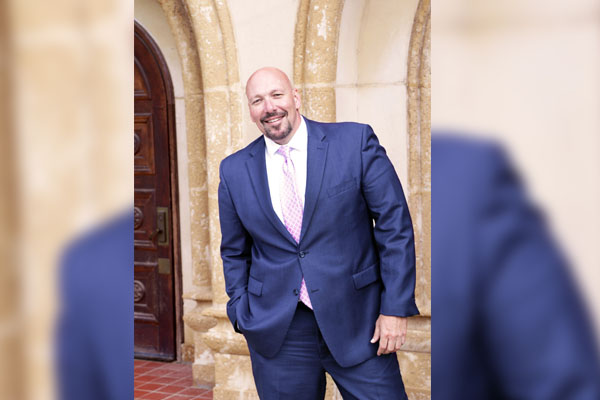
Zen Executive: If people get clear on what their why is, they can find organizations that align with them. It makes the work not so much work because they actually love what they’re doing.
I talked to you a little bit about my early journey once I figured out materialism wasn’t the thing. I even moved around from one company to a different company. What became clear to me was that I’m looking for something that has some noble contribution back to the world. I want to be of service or work for an organization that is of service. At least in that way, I can feel I am contributing back somehow. Certainly, I still want to maintain my standard of living and all of those things. Are there organizations where I can do that and feel good about what we’re doing in the world?
That was my own inclination. I wanted to be of service. The first thing I want to say is if people get clear on what their why is, they can find organizations that align those things for them. It makes the work not so much work because you love what you’re doing. You nailed it. Some companies are good at their mission statements. It begins to identify how they show up in the world. There’s a real connection point and others don’t.
The reason is so important. I talk about it in the book. People miss the opportunity with a mission statement for an organization or even individually. If you make it short, memorable, and compelling, and it comes from the grassroots or the ground up, meaning your associates help you develop what that is. It’s not aspirational, “We want to be the number one whatever in the world.” That doesn’t hold water in times of struggle. You’re looking for, “What are we in the world? How do we identify? What are the qualities and things we identify with already? What’s our purpose?”
The more people in your organization that identify with that mission statement, the more you have this collective touchstone that you’re all referring to. It’s guiding all of you. It’s this thing that is greater than all of you, but you’re all aligned behind and working towards it. It creates this collective affirmation that everyone can get behind and is aspiring to hold to, if you will.
If the mission statement we have here is good, we use it to help make business decisions. We’re not making strategic decisions or business decisions without someone saying, “How does this fit into our mission? Does it align with our mission? Does it help us fulfill our mission?” A good mission statement or understanding your why as an organization or individual can help guide you in terms of how you go forth in the world in terms of individual or collective decision making.
This idea of alignment is huge because you do want to find a place where you feel like there’s resonance and that your values fit. It doesn’t work well if you don’t have that. At Coca-Cola, we talk about refreshing the world and making a difference. The refreshing the world part is more than just about our beverages. It’s, “How do we create connections, unity, and moments of love and experiences?” Make a difference is, “What’s the fingerprint we’re going to leave? What’s the legacy? How are we choosing to show up in the world?”
These things are nuances, but we do understand what they mean. You’re right. They guide our choices every day. What type of decision are we going to make? That happened a lot in COVID because all of a sudden, everything changed. People were in trouble. For our business, so many of our customers were shut down. All of a sudden, the values of our company, the mission of doing right and doing good, comes to the forefront of, “What’s the right action to deal with this crisis?” If you don’t have that, you feel a bit rudderless. You have your own sense, but if everyone’s singing off their own song sheet, the music isn’t always very beautiful.
The collective expression isn’t going to show up in the way you want.
Make time for yourself. If you really want to change how you're showing up in the world, you have to put yourself first. Share on XLeading By Example
This is a leadership narrative that we’re talking about. You are leading at the highest level, setting the tone for an organization. Part of this show is the idea of compassion and how we drive our consciousness. The other piece of this is the role of leadership in the world. Leadership can be in a role like a CEO, but there’s also leading of self. The changes in our world are demanding that leadership step up to a higher level of consciousness and collaboration.
You talk a lot in the book about command, control, fear, and intimidation. For many years in the States, we’ve dealt with the idea of competition and scarcity versus how we each find our place in the market. How do you see the importance of leadership and how leaders need to evolve and set the tone as we create a new world?
I’ll start at the very basic level. To create a collective change, you need a lot of people that are of a mindset and that are healthy emotionally and physically. If you are sending your associates home because you’ve led all day, all week, or all month with fear and intimidation, they’re stressed out and have anxiety. They’re carrying that home and leaving a ripple effect of that. We talked about that earlier. It impacts how you show up in the world. They’re snapping at people. They’re road raging.
It’s not who they are as a person. It’s just that all of this collective stuff is impacting how they’re showing up in the world. As leaders, our first responsibility is to understand the influence you have on every person’s life beyond their production at whatever it is you are doing. You have the opportunity to lift people up.
You have an opportunity to lead in a way that sends people back out into the world to their homes and families feeling good about themselves and your organization, feeling heard and taken care of. They go and create a completely different ripple effect in the world, leaders who can begin to understand that connection and level of influence are important.
The second thing is, in addition to that, understanding not only the compassion piece. When you’re doing all those things, you’re also helping your associates not only be healthier but more productive. I guarantee you that production, creativity, and inspiration will all rise. Organizations want to know, “How do I create engagement?” Take care of your people. Make them feel they are cared about, heard, and supported. They’ll be engaged because they’re happy to be there.
If we can start with this revolution around leadership and helping people, helping everyone feel lifted up in some ways, doing what we can to lift them up, understanding that life happens, and being okay if people are late or if something happens in their family or what have you, certainly it’s going to impact your work. Is that the most important thing from this person’s perspective? If we can lead from that perspective and lift people up, then we’ve got this collective population, at least within our organization and maybe beyond that, where people are healthier. They’re going out of the world in better states of consciousness. We can then begin to create some real change.
What you say, too, about the ripple effect of that is so important. It was interesting. We had a speaker in the Compassion Lab and she was talking about burnout. She was an accomplished doctor and had worked across many domains in the medical industry field in trauma, emergency, and heavy-duty places. She was talking about burnout.
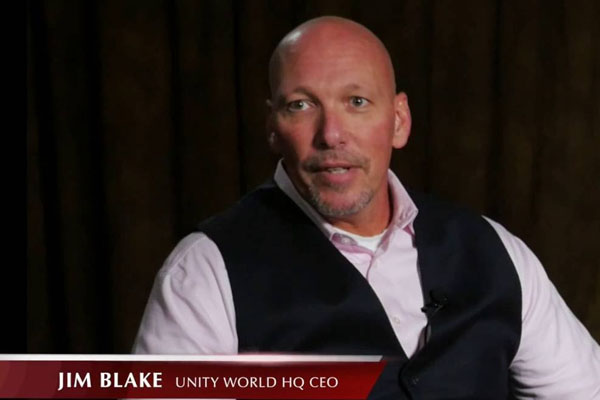
Zen Executive: With murders and school shootings, people have decided that they’re not going to accept this. They are standing up for different things, and it looks like chaos. But out of the chaos emerges order.
One of our associates asked a provocative question. They’re like, “I’m not working to save a life. I’m not working as a doctor or something that’s critical. I do my business thing. I’m working here but it’s not as important. I look at other people having to do this. Why is it so important to take care of myself?”
They got into this hierarchy of what we were doing. It led to an interesting conversation. We often wonder, “Do I make a difference no matter where I am?” You’re the CEO of a company, but I have seen people in companies that have no official roles. They’re working in some corner of the company and have more influence than our leaders because they show up with such positive energy and care for others in everything they do. They put that heart and that soul into it. It’s a leadership narrative for sure because if your leader’s not opening the field, that’s hard. People tend to shut down, but everyone can lead that way. No matter who you are, you can lead that way. Imagine if we all did. Imagine that world.
Here’s the funny thing. I had a similar scenario with someone on a team who was always happy and positive to the point where some of the team members would joke around with the person about their positive attitude all the time. One time, we got into a serious conversation around the impact of that and what it meant.
This was a development team of about 44 people. Over three-quarters of the team said they were most inspired every day by this coworker, not the leadership or the mission. What helps them come to work every day and see their job differently is this person and their attitude. We each have an opportunity to make that difference.
Order Emerges In Chaos
We do because we’re interconnected by our energy. There have been studies on this. If you have someone on your team that has a level of toxicity, meaning they’re negative and gossiping, it does a tremendous amount of damage to that team. You can’t get away from it. It’s energetic. It’s the same thing with the positive force. Here’s our throw-down, Jim. You and I are throwing this down to our readers. “Be the change” is something that has been said many times. What are you going to do to step into the arena and be that force for good? What can you do differently? It could be a little thing, but what can you do?
That’s big, especially when we think about the world that we’re living in. Someone might go, “It’s hard to be positive and joyful in this world. There’s violence and division.” We had some difficult news about violence across America. We don’t want to stick our heads in the sand and look away. It’s not about bypassing what’s happening.
It’s about acknowledging that there’s pain and suffering in the world. We’ve been changed in these last few years. It’s not just the pandemic. It’s everything else and all the divisiveness. We’re being challenged at a whole different level. How do you think this time is changing us, and how can we work with the difficulty to be better?
I’ll start with the pandemic. That whole experience, for a lot of people, reset priorities. Remember how early in the conversation we talked about becoming still? The whole country became still for maybe the first time in their lives. In doing so, they began to then question their priorities and what was important to them. It was a reset. Everybody had to do this collective reflection on what their priorities were and made space for some of that inspiration and different thinking that came forth. We’ve all reevaluated our lives and what’s important.
As a leader, your first responsibility is to understand the influence you have on every person's life beyond their work. Share on XThere was a level of deciding what we will and would not accept. After all the other things that follow and all the things that have happened in society, like the George Floyd murder and these school shootings. People have decided, “We’re not going to accept this.” You’re seeing people reach out, stand up, and stand with and for different things, maybe more so than ever before. What it looks like is chaos. This is where everyone gets caught up in the chaos.
From a quantum level and a Physics level, out of the chaos emerges order. I don’t know what that looks like and how long it’s going to take. You’re also seeing the last bastion of some old ideologies and things hanging on and holding on to maybe their last grasp before a new way of thinking. New ideology begins to emerge and replace some of these old systems and old thinking. Do the things we’ve been talking about in terms of your own spiritual practice. Do what you can to maintain your own mental health, emotional health, and well-being around these things, but also trust the process.
Many of our relatives, grandfathers, and forefathers went through similar times. If we do a little research, there were times in the 1920s, 1930s, and 1940s when they went through similar times. They thought the world was going to end. It looked as chaotic as it does now. What emerged each time was something greater. If we can hold ourselves to account to hold that vision for something greater while we’re taking care of ourselves mentally and emotionally, collectively, we’ll get through this in a powerful and profound way.
We’re in the deconstruction of anything. In order for something new to be born, there must be room. We have to make room because otherwise, we’re already in our grooves. The pandemic created that stillness for the first time. Here in Los Angeles, I remember driving on the road without traffic. It was like a new experience. Sometimes it gets forced upon us if we don’t do it ourselves. It is done to us. If we trust the process, we know that it’s leading us somewhere else.
It’s darkest before the dawn, but the sun will rise. It will rise based on our actions and choices. We don’t know how long it will take but the more we step in and choose to make choices of our highest self, it’s going to get here faster. The sun will rise quicker if we come together in that way. This is all of us together. We have our individual roles to play, but it’s all of us stepping into doing this work.
We are all in it together. It will take all of us.
Conclusion & Resources
There’s so much in this topic to go into, but I want to ask two final questions. One of them is how can people learn more about Unity and what you do? Certainly, I would encourage people to pick up the book, The Zen Executive, learn, and go deeper into the things that you’ve been talking about with me. What else can you share about Unity? How can people find the resources there?
Your best resource for what Unity does and what is offered is Unity.org. We just released a brand-new website. You’ll find it to be a unique design. Unity provides tools and resources to help people cope with the everyday peaks and valleys of this thing we call a life experience. We completely architected the website around that. People don’t care about your organization and the structure. You can find them if you’re looking for them. What you’re going to find at this site are tools and resources to help you from a spiritual perspective around things like grief, addiction, prosperity, the passing of a loved one, and what it’s like to be a caregiver.
We all know someone who’s a caregiver these days. They’re spiritual resources to help us with all of those things and so many more. There are prayer resources and affirmations. It’s all in the form of articles, blog posts, podcasts, videos, lots of multimedia, a couple of magazine offerings, some books, and some booklets. It’s centered around helping you find the tools and resources that you’re searching for in your time of need.
I would encourage everyone to visit the site and learn more about it because there’s so much there. Thank you, Jim, for your leadership and for everything that Unity is doing to provide what is needed in the times we’re talking about. Having to go through this, we all need resources.
Thank you, and thank you for the opportunity to be with you and to have such a great and powerful conversation. Finally, thank you for the work that you’re doing in the world, and for bringing these important conversations and ideas to individuals and leaders. You are part of that wheel of change that will get us to where we’re trying to be and help emerge that which is trying to come forward.
Thank you, Jim. It comes forth through these conversations, in co-creation, and in the work that you are doing in the world. What Unity is doing in the world is incredible. Is there any one last thought you want to leave our readers with as we end our conversation?
We’ve talked around the edges of it, but the most transformational part of my entire journey involves the idea of self-acceptance and self-worth. A lot of people think that sounds woo-woo, and blah, blah, blah. When you can make peace with the value of your unique expression, you are a universe creation that is only going to occur one time. You may not know why you’re here at this moment.
The sooner you can embrace that you are a unique expression with unique gifts, be okay with that. Become clear that you don’t have to conform to what people think you should wear or what you should do for a living, and have this thing around acceptance of yourself and realizing that you are worthy. It will change your experience of life. It will create a foundation from which all of these other things that we talked about will come forth.
You’ll begin to see things more clearly. You’ll begin to identify your purpose because you’ve made peace with who you are and the unique, wonderful, and powerful individual you are. It will set you on a path to go beyond even what you expected. It has done that for me and for many others. I wish each of you an abundance of self-acceptance and a powerful understanding of your self-worth. It will take you places that you didn’t think you could go.
That is such an exquisite place to end this conversation. You are worthy, free, and powerful. Be all those things. If we all do that, it’s going to be a pretty amazing world that we co-create together. Jim, thank you for everything. This has been so much fun and full of wisdom, so I’m very grateful.
Thanks so much.
Important Links
- Unity World Headquarters
- The Zen Executive
- Centers for Spiritual Living
- Divine Science
- Agape International
- IamJimBlake.com
About Jim Blake
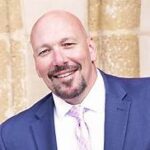 Jim Blake is the CEO of Unity World Headquarters, where he previously served as chief information officer and vice president of operations. Unity is a spiritual nonprofit founded in 1889 in Kansas City, Missouri. It helps people of all faiths and cultures apply positive spiritual principles in their daily lives.
Jim Blake is the CEO of Unity World Headquarters, where he previously served as chief information officer and vice president of operations. Unity is a spiritual nonprofit founded in 1889 in Kansas City, Missouri. It helps people of all faiths and cultures apply positive spiritual principles in their daily lives.
Love the show? Subscribe, rate, review, and share!
Join The Coca-Cola CMO Leadership Summit Podcast community today:
Dealing With Chaos, Finding Your Why, intuition, Leading By Example, Self Care, Zen Executive
